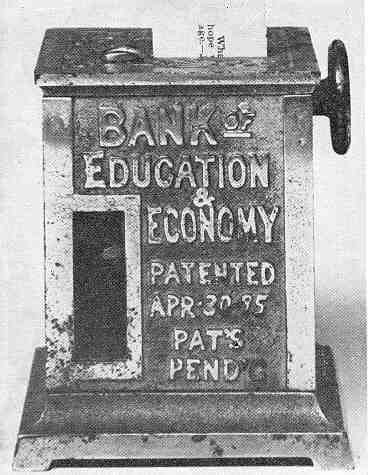Bank of Education and Economy
by F.H. Griffith - HOBBIES Magazine - August, 1962
 Education and economy are two words
which are probably used with greater frequency today than at any time during our history.
We continually hear and read about the importance of education on the television, radio,
newspapers, and so on. The same applies to our economy. So these two words, over the
years, have continued to attain more important meaning and more frequent usage right up to
our present time. Now let’s go back a number of years to 1895 and we find ourselves
in a period where some foresighted individual or individuals used the two words in
combination to appropriately name a mechanical bank. This bank, our choice as No. 106 in
the numerical classification, is the Bank Of Education And Economy, and its action and
appearance carry through and well illustrates the chosen name. It is a very neat trim bank
and is unique and completely different than any of the other mechanicals.
Education and economy are two words
which are probably used with greater frequency today than at any time during our history.
We continually hear and read about the importance of education on the television, radio,
newspapers, and so on. The same applies to our economy. So these two words, over the
years, have continued to attain more important meaning and more frequent usage right up to
our present time. Now let’s go back a number of years to 1895 and we find ourselves
in a period where some foresighted individual or individuals used the two words in
combination to appropriately name a mechanical bank. This bank, our choice as No. 106 in
the numerical classification, is the Bank Of Education And Economy, and its action and
appearance carry through and well illustrates the chosen name. It is a very neat trim bank
and is unique and completely different than any of the other mechanicals.
The specimen shown is from the ever increasing collection of Leon Perelman, a more or less recent and most avid collector of mechanical banks. It is in nice complete original condition and was purchased by Mr. Perelman from an antique dealer near Fostoria, Ohio, about a year ago.
Unlike a number of the mechanical banks, the background of the Bank Of Education And Economy is easily determined as this information appears in detail on the bank itself. It is unusual for a mechanical bank to be dated and also have the maker’s name thereon. On the front, under the name, as shown in the picture, is the date "Patented April 30, 1895" with "Pat’s Pend’g." On the underside of the base appears the name of the concern who made the bank—"Mfg-By Proctor-Raymond Co., Buffalo, N.Y." It is made of cast iron with a nickel plated finish. The top, sides and back are cast with a very attractive scrollwork which definitely adds to the appearance of the bank.
Actually, like the Pump And Bucket and several others, the Bank Of Education And Economy is a dime savings device. That is to say it is necessary to use a 10c piece for proper operation. The coin is placed in the provided slot in the top of the bank. Then the knob on the right, shown in the picture, is turned clockwise and this causes a paper slip to come up through a slot provided for this purpose. Part of the paper slip is shown in the photograph. As this action takes place the dime goes into the glass front section. The slip of paper can then be torn off and the bank is ready for another coin. The paper slip has a question printed on the front and a quotation or saying on the back. The question is to be answered by the operator, of course, and at the same time he learns a saying or quotation.
The mechanism inside the bank is very well made and will not operate, nor can the knob be turned, until a dime is dropped into the coin slot. The dimes accumulate and stack neatly in the glass front section. As they continue to stack up a lever rises higher and higher from the top of the bank. After a certain number have been saved the lever is depressed and this automatically releases the sliding coin trap in the base. The many different questions and quotations are printed on a rather sizeable continuous roll of paper inside the bank.
The Bank Of Education And Economy is a very unusual little bank, and in conclusion it is of interest to note several of the wordings that appear on the original complete roll of the writer’s specimen of the bank:
Question—"Where was Samual Sullivan Cox born?"
Quotation on back—"There are three things difficult —to keep a secret, to suffer an injury, to use leisure—Voltaire."
Question—"What classic literature has Mr. Gladstone studied very carefully?"
Quotation on back—"The true university of these days is a collection of books—Carlyle."
Question—"What became of William Couper in 1763?"
Quotation on back—"Strong reasons make strong actions—Shakespeare."
Educational, philosophical, and an interesting bank to have in a collection.
